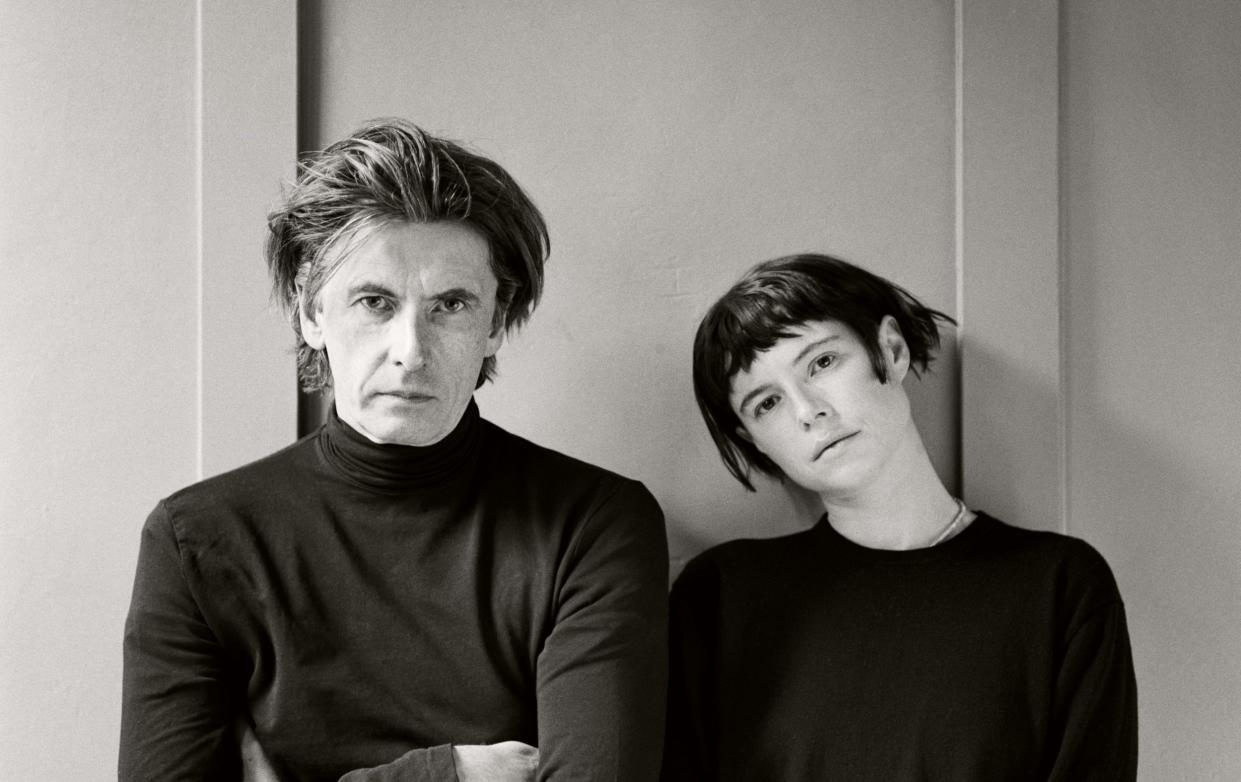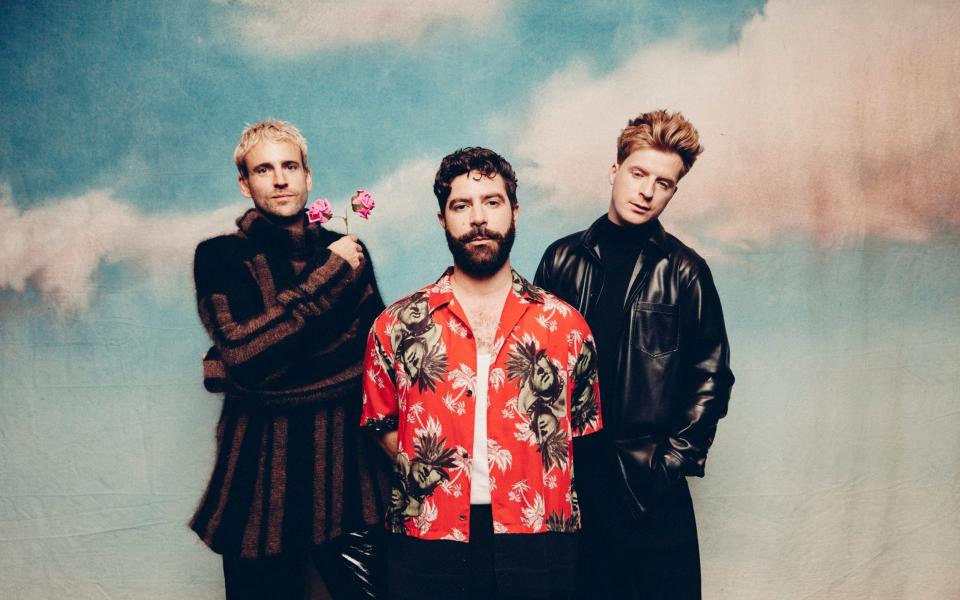Jessie Buckley channels Joni Mitchell, Nova Twins storm the rock scene – the week’s best albums

Jessie Buckley and Bernard Butler, For All Our Days That Tear the Heart ★★★★☆
Famous actors who release albums are brave souls. For every decent stab – Scarlett Johansson’s 2008 LP of Tom Waits covers was memorable; Minnie Driver released a solid set of songs in 2004 – there are multiple bizarre efforts, from Steven Seagal playing yacht rock to Christopher Lee releasing an album of symphonic heavy metal. No matter the genre, the performer’s dual career invites extra scrutiny. And it’s always hard to escape the whiff of “vanity project” about such releases.
But this album by Irish actress Jessie Buckley and former Suede guitarist Bernard Butler is a different kettle of fish. The career of Buckley, in case you’ve been living on another planet, has gone stratospheric in recent months: she was nominated for an Oscar for The Lost Daughter earlier this year, after which she won an Olivier Award for playing Sally Bowles in the London stage revival of Cabaret and received critical praise for her recent role in folk-horror film Men. But this album doesn’t sound like a side-dabble. For All Our Days That Tear the Heart is a set of accomplished folk songs that are carried by Buckley’s characterful voice (anyone who has seen the film Wild Rose knows she can sing) and underscored by some of Butler’s most sophisticated arrangements since he left Britpop originators Suede in 1994.
Buckley has called the pairing “bananas”. She and Butler met over FaceTime when she was up a mountain in Kerry in the west of Ireland before lockdown took hold. A mutual friend thought there might be a creative spark – and there was. For a start, Butler used to holiday in Killarney, also in Kerry; they bonded over folk singer Sam Lee’s album Old Wow, which Butler had produced, and much more besides.
It’s not what you might call a breezy album. Its musical arrangements are complicated, and its lyrics are heavy with literary references. Take its opening track, The Eagle & The Dove, which is named after a 1943 feminist biography by Vita Sackville-West. It starts with half a minute of an unsettling, multi-tracked choral chant by Buckley which was inspired by a film she’d seen of Georgian men singing Christmas songs around a dinner table. It then becomes a beautiful Bert Jansch-like acoustic number with lyrics that reference changing seasons and wild beasts, matadors and bulls, love, faith and lust. Strings and ghostly wails gently weave in and out of the melody, while beneath all this you can hear the sound of flamenco dancing. These are the feet of choreographer Juana Jimenez, who Butler recorded by placing two microphones on the floor at her dance school in a village hall in rural Essex. There’s a physicality, a density and a seriousness to these tracks. Other songs are inspired by the American artist Alex Kavensky and the work of novelist Richard Brautigan.
This may, on the face of it, sound overbearing. And in a very few places, such as the track 20 Years A-Growing, it is. But it’s saved by two things: Butler’s lightness of touch and Buckley’s voice. Despite the intricate arrangements, Butler’s playing is understated and always sympathetic. Meanwhile, Buckley’s voice is nuanced one minute and soaring the next. There’s a sustained run of notes about four minutes into the title track that are breathtaking. Her voice contains elements of Joni Mitchell, Laura Marling and – on Footnotes on the Map – Chrissie Hynde. She’s having fun, too. Butler has said there is “such joy” in Buckley, and he’s right: you can hear it. Their pairing might well be bananas, but it works. Buckley is certainly no luvvie on leave. This is, at times, a dazzling album. James Hall
Nova Twins, Supernova ★★★★★
Nova Twins have achieved a great deal for a band that started by accident. Eight years after twenty-something friends Georgia South and Amy Love wrote their first song together to stave off boredom on a rainy afternoon in Lewisham, the pair have, with fierce determination, ascended the ranks of an increasingly heterogeneous rock scene. Certainly, the 2020 verdict of Tom Morello, the guitarist with Rage Against the Machine, that theirs is “the best band you’ve never heard of”, is now well past its sell-by date. Just this week, they appeared at the Meltdown festival on London’s South Bank at the behest of none other than Grace Jones. Beat that for an anointment.
As its title suggests, Supernova, the duo’s second album, is a kaleidoscopic mosh-pit in which disparate genres are not so much traversed as smashed together. Imagine a speed-dating night at which everyone is in the mood. Here, the worlds of metal and pop, grime and dance, punk and hip hop somehow merge as if nothing on earth had ever divided them. As young women who came of age in the era of Spotify, for South and Love it might seem as if nothing ever did.
In lesser hands, an album that at times sounds like R2D2 breakdancing in an industrial spin-dryer might make for trying company. Yet, for all their Day-Glo stridency, Nova Twins not only know how to write songs, but how to arrange them too. On tracks such as the coiled and twitching Enemy (“do you think that we would go away? Me and my clique, yeah, we’re here to stay”) and the exceptional Sleep Paralysis, the bombast is underwritten by something a good deal more enduring than mere self-confidence. At moments such as these, and elsewhere, the duo’s air of accomplishment is pure sophistication.
With a running-time of barely 30 minutes, Supernova makes its point with a fearsome economy that might just hark back to the days when its authors struggled to get noticed. There were times, even, when music journalists would knowingly exclude them from festival reviews that profiled every other band on the bill. Believe me, those days are over. Ian Winwood

Foals, Life is Yours ★★★★☆
What exactly have Foals got to sound so happy about? When last we saw them, it was with the sprawling behemoth that was their last pair of albums, 2019’s Everything Not Saved Will Be Lost, Parts 1 then 2 – an insular, occasionally granite-stern duo, the muse for which frontman Yannis Philippakis has since referred to as “doom soup”.
Somewhat ironically, half the touring for it actually was lost thanks to Covid. And then, on top of it all, last September, keyboardist Edwin Congreave announced he was leaving the band to study economics and work to “mitigate the imminent climate catastrophe”.
Life is Yours may have been written from the depths of a well, but it expresses a sincere longing for what’s outside it. The album yearns for pubs and friends and going out and staying up late and laughter and fun. Without a feeling that it’s intentionally waiting for the rain in order to go out dancing in it, it draws on its authors’ memories of the good times – reflecting, according to Philippakis, right back to their earliest days – and projects them huge and bright.
The title-track thrusts in, shining with a handful of The Human League’s gutter-glitter, before the energised Wake Me Up announces itself with a strutting bassline reminiscent of Mark Ronson and Bruno Mars’s Uptown Funk. Later, on a sassy, winking guitar motif, 2001 parties like it’s 1999. These are songs that are very much for going out-out.
Philippakis is an often enigmatic writer, not a man given to showing his entire hand. Rather than matching his words exactly to the self-evident good vibrations of the music, he finds lyrical knots to pick at and undo, which add an emotional anchor. “All my life I’ve been looking for a light that I can’t reignite again,” he sings on the woozy song 2am. But even in these moments, he feels as though he’s looking upward and outward, moving on, heading for better days.
What have Foals got to sound so happy about? Simply that, after everything, they’re still here. Nick Ruskell

Perfume Genius, Ugly Season ★★★★☆
The phrase “body of work” seems particularly suited to Perfume Genius, aka American art-pop songwriter Mike Hadreas. Always concerned with corporeality and queerness, his own body graces the covers of all six of his albums, from his slight frame on early, raw-boned ballads about sex and addiction, to the vintage masculinity of 2020’s robust, accessible Set My Heart On Fire Immediately.
On the cover of his sixth album, Ugly Season, dynamic brushstrokes blur Hadreas’s portrait. The songs within originate from The Sun Still Burns Here, a modern dance piece he devised with choreographer Kate Wallich and performed across America in 2019. The physicality of those shows inspired the songwriting on Set My Heart: Ugly Season is the nebulous universe from which that sturdy pop album sprang.
Among the tracks on the new album, Pop Song hews closest to its tongue-in-cheek title, harp-stabbed and spiny like a porcupine, while harbouring soft vulnerability within. But really, Ugly Season operates outside of pop convention. The songs are long, light on lyrics, and spattered with strange sounds and tempo shifts. The opener, Just a Room, is as scant as Hadreas’s earliest work, followed by organ drones and weightless falsetto on Herem. The instrumental track Scherzo edges into neo-classical realms, while Hellbent sounds as urgent as its name, synths throbbing towards oblivion. There are precious, sporadic bursts of pop too: electronic codas, glockenspiels, the rhythmic shuffle of the title track, and Eye In The Wall – a disco inferno at its darkest.
Ugly Season may seem just that to those who prefer Hadreas’s smoother side. Yet the most compelling elements of his work remain, and the album is a culmination of one of the most consistent and emotionally generous artists today. Without the focus of the dance performance, the onus is on the listener to concentrate – but the rewards are as rich as ever. Kate French-Morris

 Yahoo News
Yahoo News 
